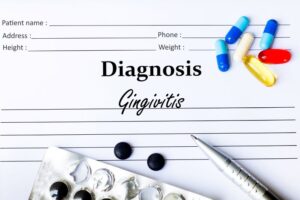
Gum disease is an extremely common oral health problem; it affects roughly half of adults in the U.S. It is particularly prevalent among older individuals and those with certain lifestyle habits, such as smoking and inconsistent oral hygiene. Left untreated, it can lead to devastating consequences. But how can you know whether you have gingivitis (the early stage of gum disease)? This blog post explains a new innovation that may help.
Saliva Testing for Gingivitis
At first, the symptoms of gingivitis may be very subtle; you might not even recognize them. As the disease worsens, you may start to notice changes in your mouth, such as sore, inflamed gums, bleeding when you brush and floss, and bad breath.
Of course, symptoms alone do not equate to an official diagnosis. To find out with a reasonable degree of certainty whether you have gingivitis, you may soon be able to take a convenient at-home test.
Researchers at the University of Cincinnati have been working on a biosensing device that can detect the specific bacteria that cause gingivitis and the advanced stages of gum disease. Using a sample of saliva, it employs special antibodies that react to the endotoxins that are released when gum disease bacteria disintegrate. Because saliva is such a complex fluid, it took a while for the researchers to find a way to single out the gum disease-causing bacteria.
The at-home test is not yet available. However, it may soon hit the market and signal a big shift in the way gum disease is diagnosed. It could provide a valuable early warning against this condition, which could allow you to make healthful changes that protect your smile from serious harm.
Identifying and Fighting Gingivitis
Even though home tests for gingivitis are not yet accessible, you can and should keep a close eye on your oral health and visit your dentist every six months for a checkup. They may notice signs of gum disease before you do, which could allow you to take proactive steps to prevent the disease from progressing. For example, you might need to:
- Adjust your oral hygiene routine. Your dentist may coach you on techniques that can minimize the number of harmful bacteria in your mouth.
- Use different products. Some oral hygiene products are specifically designed to fight disease-causing bacteria.
- Make dietary changes. A diet rich in vitamin C and other health-supporting nutrients can reduce the risk of gum disease.
- Undergo gum disease treatment. You might need antibiotics, or you may need to undergo a deep cleaning of your mouth.
Gum disease should be detected and dealt with as early on as possible. Ask your dentist for information on how you can recognize and fight this common condition.
Meet the Practice
Drs. Thomas Novak, Garret Johannsen, and Brent Collins are the dentists at Beacon Dentistry of Weatherford. Under their expert leadership, our team offers a full range of services, including gum disease therapy and preventive care. If you are concerned about your gum health, we would be pleased to speak with you. Contact our office at (817) 230-4340.